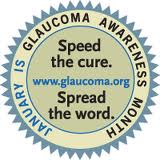 January is “National Glaucoma Awareness Month”. The Glaucoma Research Foundation estimates there are about 2.7 million Americans, 40 and older, living with the disease. This figure is expected to almost double by 2030, with African American and Latino communities affected in disproportionate numbers. Thankfully, due to medical and pharmaceutical advances, glaucoma is no longer synonymous with blindness. When indicated laser/microsurgery relieves the intraocular pressure, but often leads to scarring at the surgical site. A new antibody-based drug developed in England shows great promise in preventing post-surgical scarring. When caught early, medicinal eye drops, along with magnifying devices and “tweakings” in the home environment, allow most glaucoma sufferers to live full and productive lives without the need for surgical intervention.
January is “National Glaucoma Awareness Month”. The Glaucoma Research Foundation estimates there are about 2.7 million Americans, 40 and older, living with the disease. This figure is expected to almost double by 2030, with African American and Latino communities affected in disproportionate numbers. Thankfully, due to medical and pharmaceutical advances, glaucoma is no longer synonymous with blindness. When indicated laser/microsurgery relieves the intraocular pressure, but often leads to scarring at the surgical site. A new antibody-based drug developed in England shows great promise in preventing post-surgical scarring. When caught early, medicinal eye drops, along with magnifying devices and “tweakings” in the home environment, allow most glaucoma sufferers to live full and productive lives without the need for surgical intervention.
Occupational therapists play an increasingly significant role on the low vision management team, particularly regarding issues of compliance and adaptation. OTs assiset patients with eye drops insertion, sorting of medications into weekly pill boxes, selecting home lighting by room/task, and removing safety hazards such as rugs or cords, etc. In optimizing patients’ daily living environments, therapists help create a functional quality of life in the face of an otherwise limiting visual field. Products like the uBox – a smart pillbox for improving medication compliance; the Pebble Mini – an ultra-compact, hand-held magnifier; and the Optik LED Bar Light – an attachable, lightweight light source for eyewear; … all are new designs useful to the implementation of any glaucoma therapeutic plan.
Expect to see more of these low vision technologies emerging in the coming years, along with medical innovative treatments as researchers push towards an eventual cure for the disease. Occupational therapists can expect to remain at the forefront of the field, providing invaluable patient support. If you are an OT or COTA interested in working with glaucoma or other optically impaired patients contact Centra at 800 535 0076 and let us help you “see” your way to a better future.